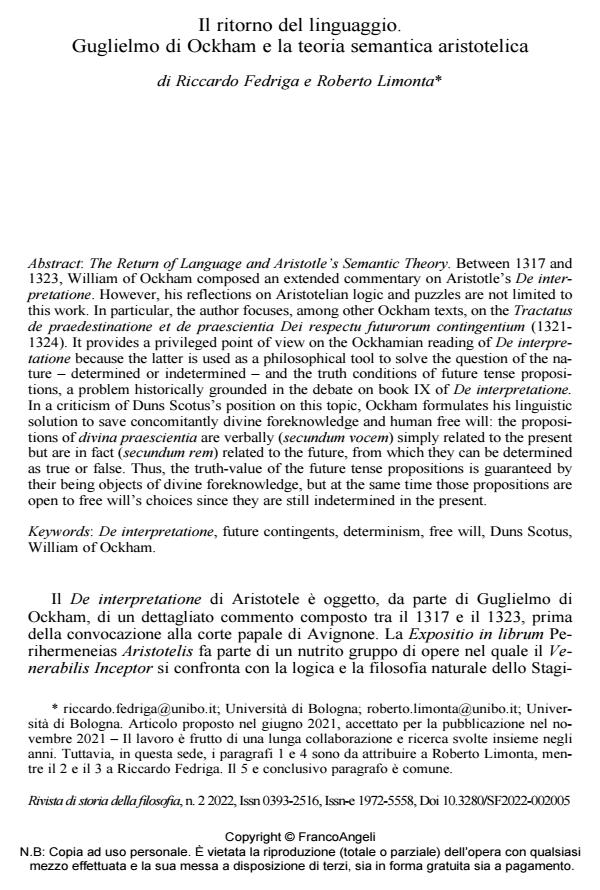Il ritorno del linguaggio. Guglielmo di Ockham e la teoria semantica aristotelica
Titolo Rivista RIVISTA DI STORIA DELLA FILOSOFIA
Autori/Curatori Riccardo Fedriga, Roberto Limonta
Anno di pubblicazione 2022 Fascicolo 2022/2
Lingua Italiano Numero pagine 27 P. 273-299 Dimensione file 274 KB
DOI 10.3280/SF2022-002005
Il DOI è il codice a barre della proprietà intellettuale: per saperne di più
clicca qui
Qui sotto puoi vedere in anteprima la prima pagina di questo articolo.
Se questo articolo ti interessa, lo puoi acquistare (e scaricare in formato pdf) seguendo le facili indicazioni per acquistare il download credit. Acquista Download Credits per scaricare questo Articolo in formato PDF

FrancoAngeli è membro della Publishers International Linking Association, Inc (PILA)associazione indipendente e non profit per facilitare (attraverso i servizi tecnologici implementati da CrossRef.org) l’accesso degli studiosi ai contenuti digitali nelle pubblicazioni professionali e scientifiche
Between 1317 and 1323, William of Ockham composed an extended commentary on Aristotle’s De interpretatione. However, his reflections on Aristotelian logic and puzzles are not limited to this work. In particular, the author focuses, among other Ockham texts, on the Tractatus de praedestinatione et de praescientia Dei respectu futurorum contingentium (1321-1324). It provides a privileged point of view on the Ockhamian reading of De interpretatione because the latter is used as a philosophical tool to solve the question of the nature - determined or indetermined - and the truth conditions of future tense propositions, a problem historically grounded in the debate on book IX of De interpretatione. In a criticism of Duns Scotus’s position on this topic, Ockham formulates his linguistic solution to save concomitantly divine foreknowledge and human free will: the propositions of divina praescientia are verbally (secundum vocem) simply related to the present but are in fact (secundum rem) related to the future, from which they can be determined as true or false. Thus, the truth-value of the future tense propositions is guaranteed by their being objects of divine foreknowledge, but at the same time those propositions are open to free will’s choices since they are still indetermined in the present.
Parole chiave:De interpretatione, future contingents, determinism, free will, Duns Scotus, William of Ockham.
Riccardo Fedriga, Roberto Limonta, Il ritorno del linguaggio. Guglielmo di Ockham e la teoria semantica aristotelica in "RIVISTA DI STORIA DELLA FILOSOFIA" 2/2022, pp 273-299, DOI: 10.3280/SF2022-002005